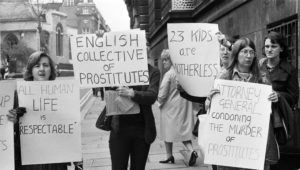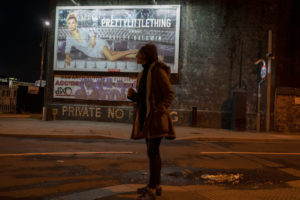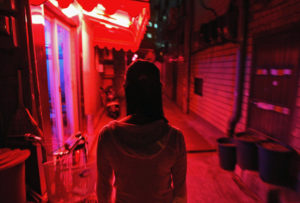I see the worst of humanity, the very depths of depravity: I am a reporter on male violence against women and girls. There was a time in Sarajevo, not long after the Balkan war, when I witnessed a dozen women being paraded around a market, naked — their teeth being inspected as if they were farm animals — before they were sold to the highest bidder, to be shipped to brothels. I spent time in a refugee camp in the Middle East, where I heard the screams of girls being sexually assaulted by men as they walked to the latrine in the dark. And I have seen the most violent pornography imaginable.
As a reporter, I am supposed to bear witness: to expose the truth relentlessly and seek justice. I thought I could cope with seeing such horrific things; I would reassure friends that I was fine and point out that I was not the victim in these scenarios. Over the years, I have avoided examining how being immersed in a world of rape, child abuse and femicide has affected me. I would always support those feminist activists who threw in the towel to retire to Spain, but I would feel a bit bemused by their actions. Why would you want to take up gardening, instead of being an agent of change?
Then something shifted. Investigating yet another atrocity, over the past few years, I have been overwhelmed by anxiety and depression, unable to sleep. I now understand why some activists retire.
It began with the murder of a seven-year-old girl. Nikki Allan lived with her mum and three sisters in a run-down block of flats in Sunderland. One day, in 1992, a man took her to the wasteland outside a derelict warehouse and sexually assaulted her. When Nikki screamed, he pushed her through a window into the building, chased her into a far corner, and shattered her little skull with a brick. He then stabbed her 37 times, before dragging her into the basement. There he left her, propped up against the wall like a rag doll.
Police focused their investigation on a man named George Heron, seen as the local oddball. They effectively coerced a confession out of him. The following year, he was acquitted of murder at trial, after the judge ruled the confession out, but was forced to go into hiding because people in the local community were convinced of his guilt. Nikki’s mum, Sharon Henderson, believed Heron had got away with her daughter’s murder, because the police repeatedly told her that there were no other suspects. The media reinforced this narrative.
I picked up the story in 2006. Visiting my parents in Darlington, not far from where Nikki was murdered, I saw a photograph in the local paper of a woman standing by the grave of a child. The headline read: “Mum’s bid to dig up daughter”. Sharon was asking police to exhume Nikki’s body, in order to test it for DNA evidence, following a change in the law on double jeopardy, which prevents someone being tried again on charges of which they’ve been previously acquitted. More than a decade after her daughter’s murder, Sharon was still fighting for justice.
“I always said I would never, ever give up campaigning for Nikki until her murderer was locked up,” Sharon told me. “Not until the police answer for that first so-called investigation.”
I first interviewed Sharon shortly after reading that newspaper story. A single mum from a rough part of town, she felt that the police weren’t taking her seriously. Over the years, I’ve kept in contact with Sharon, admiring her tenacity, and her refusal to accept that the police had done right by her daughter.
And then, in May 2022, the unexpected happened. A man named David Boyd was charged, 30 years after Nikki was murdered. A child sex offender, with convictions dating back to 1986, Boyd lived three doors down from where Nikki disappeared, and had moved away from the estate shortly after the murder. When questioned, Boyd had lied, presenting a made-up alibi. So focused were the police on Heron, they didn’t even bother to check it.
By this point, I had started working on a podcast series about Nikki’s murder, originally with the intention of marking the 30th anniversary, and to give Sharon’s campaign a boost. It felt like we were close to getting justice. I attended every day of the trial, renting an apartment close to Newcastle Crown Court. Sharon and her family would come there between sittings, for respite. I saw, as I had over the previous 17 years, how much pain Sharon was enduring. But here she was, struggling on. The evidence at trial was harrowing. Sharon did her best to listen. But most of the time she would leave the public gallery after only a few minutes, sobbing. “Imagine listening to what that bastard did to your bairn,” says Sharon. “The details of how he murdered her will never leave my mind.”
Day in, day out, the particulars of the murder were played out: the forensic pathologist who examined Nikki’s body in situ back in 1992 came to repeat her evidence, 31 years later. A blood splatter expert, she painted a vivid picture of what had happened to Nikki in life and in death. We saw video footage of the crime scene. Nikki’s body was pixelated out, but the brick that had killed was in plain sight.
“Vicarious trauma” is a term used by psychologists to describe the effect of witnessing or hearing horror stories. It is increasingly recognised as a potential consequence of working directly with seriously hurt and injured individuals — an occupational hazard among Accident and Emergency personnel, for instance, or social workers who witness child cruelty. With wider recognition of the condition, it is becoming more commonplace for employers to offer counselling to staff who encounter atrocity in their working lives.
I feel uncomfortable claiming to be experiencing “vicarious trauma”. I’m not the victim here. I have always felt it important to be resilient, when focusing on the women and girls directly affected by a crime. But something snapped in me, with this story.
During the trial, I would find myself crying at home for no apparent reason. I would be too tired to blank out the stories I’d heard, but then have trouble sleeping. I’d stay awake watching Netflix as a way of escaping my intrusive thoughts, my hypersensitivity, and a feeling of deep, deep despair. I suffered extreme neck and shoulder pain, attributed partly to five weeks of scribbling in a notebook every day in court, but also to the tension of hearing the evidence, and trying not to cry on the press bench. I started getting headaches. I would imagine all kinds of horrific things happening to my loved ones, anything from car crashes to brutal murder.
What was it about the Nikki Allan case that kept me awake night after night, driving me into a depression? It was not the first time I had reported on the case of a murdered child, or seen such terrible evidence in court. But in time, I have come to realise that so many aspects of the case resonated with my own childhood experience, and what I escaped. Growing up in the North East, I witnessed how the police dismiss working-class women, in particular single mothers; I saw how child sexual abuse was minimised. Boyd was free for 30 years to abuse girls a short drive from the rough housing estate I grew up on, where men targeted me and my friends.
I was first flashed at when I was nine years old. Aged 12, a man violently grabbed my breast as he walked past me in the middle of the town centre. At 16, I was raped by an older man I considered a friend. My job cleaning in a pub ended abruptly when a campaign of horrific sexual harassment culminated in an attempted rape. By this time, I was 17, and had recently joined the ranks of feminists fighting against sexual and domestic violence.
I was drawn to the cause partly because of my own experiences, but also inspired by the widespread protests about the police investigation into the so-called Yorkshire Ripper. The misogyny and class prejudice that underpinned this investigation — the idea that the victims were “common prostitutes” and were therefore somehow complicit in their fate — felt familiar to me. Many of the women I was raised among would be seen as the kind who would be “asking for it” simply for going to the pub alone, when they should have stayed safely at home.
Returning to the North East, spending time so close to where I was raised, amid Nikki’s grieving, traumatised family, I sometimes caught myself wondering how my life would have turned out had I stayed put in Darlington. Had I never found feminism. Sharon’s life could have been mine.
But anyone doing this work, immersed in the harsh reality of it, is bound to struggle with the toll it takes on our mental health. I see rape and domestic abuse routinely dismissed and minimised. Victims are dismissed, disbelieved, or blamed for their own predicaments. I also see men excused. They are reassured that what they have done is “not so bad”. Meanwhile, women such as Sharon Henderson are fighting against a system that views them as irritants.
And if the crimes themselves aren’t taken seriously enough in the mainstream, why would those of us reporting on them be given any consideration? Instead, we see the trivialisation of both sexual violence and of the hellish side effects of campaigning for change. I will never understand how Sharon must feel, having lost her seven-year-old daughter to murder; I do know what it is like to be silenced and misrepresented when speaking out against atrocities committed by men, and police inaction.
So, I will always be inspired by women like Sharon (in May, Boyd was found guilty of Nikki’s murder and jailed for life, with a minimum term of 29 years). One positive I cling to, in this bleak state of affairs, is the sense of solidarity that often flourishes between women. Sharon may never have considered herself a feminist campaigner until the unimaginable happened. But the rest of us have so much to learn from her tenacity.
‘Three doors down‘, Julie Bindel’s podcast series on the case of Nikki Allan, is out now
Disclaimer
Some of the posts we share are controversial and we do not necessarily agree with them in the whole extend. Sometimes we agree with the content or part of it but we do not agree with the narration or language. Nevertheless we find them somehow interesting, valuable and/or informative or we share them, because we strongly believe in freedom of speech, free press and journalism. We strongly encourage you to have a critical approach to all the content, do your own research and analysis to build your own opinion.
We would be glad to have your feedback.
Source: UnHerd Read the original article here: https://unherd.com/




